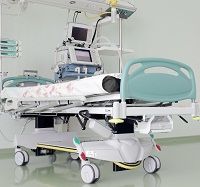Article
Anxiety, Depression, and PTSD Common in Acute Lung Injury Patients
Author(s):
A large percentage of acute lung injury survivors in the ICU may have clinically significant general anxiety, depression, or post-traumatic stress disorder symptoms that tend to co-occur across domains.

Results from a study published in Critical Care Medicine indicate that the majority of acute lung injury survivors in the ICU appear to have clinically significant general anxiety, depression, or post-traumatic stress disorder (PTSD) symptoms that tend to co-occur across domains. Nearly one-quarter of patients in the study suffered from PTSD.
“PTSD can drastically impact a person's ability to communicate and connect with others, truly interrupting their lives and preventing experiences of joy,” said Joe Bienvenu, MD, associate professor of psychiatry and behavioral sciences, Johns Hopkins University School of Medicine. “This is why our findings are important and why it's so critical that we continue to research ways to prevent PTSD.”
Although previous research has assessed PTSD in ICU patients, these studies were based on small datasets. “We now have a larger data set to review and learn from,”said Ann Parker, MD, fellow, Division of Pulmonary and Critical Care Medicine, Johns Hopkins Medicine. “These data could help us develop better prevention methods for ICU-induced PTSD.”
Through a systematic literature review, the research team looked at 40 studies of 36 unique patient cohorts with a total of more than 3,000 patients who survived a critical illness and ICU stay. The researchers excluded patients who had suffered a trauma, such as a car crash, or brain injury, because those patients' cognitive and psychological outcomes can be affected by the injury itself, rather than the critical illness/ICU stay. They found that the prevalence of PTSD in the studies ranged from 10 to 60 percent.
To pinpoint a more definitive estimate of PTSD prevalence, the researchers conducted a meta-analysis of a subset of the 40 studies. They selected six studies, with a total of about 450 patients, that used a PTSD measurement tool called the Impact of Event Scale between one and six months after ICU discharge. From these data, they found that one in four patients had symptoms of PTSD. The researchers repeated the same meta-analysis for studies that looked at patients seven to 12 months after an ICU stay and found that one in five patients had PTSD. "These rates are as high as you might see in combat soldiers or rape victims," said Dale Needham, M.D., a professor of medicine and of physical medicine and rehabilitation at Johns Hopkins. "Our clinicians and patients should know that the high risk of PTSD exists among patients surviving critical illness."
Common risk factors for PTSD included being diagnosed with a psychological problem, such as anxiety or depression, before coming to the ICU, the researchers found. Another risk factor was receiving large amounts of sedation medication while in the ICU. Additionally, patients that reported having frightening memories of being in the ICU have a higher risk of PTSD.
These symptoms occur across a wide variety of patients, regardless of their age, diagnosis, severity of illness or length of stay. "This tells us that if we focus on factors traditionally associated with worse physical outcomes, such as a patient's age, we may miss individuals with psychiatric symptoms," said Bienvenu.
The researchers also looked at the best ways to prevent PTSD. The solution that seemed most effective was an ICU diary, a notebook that allows clinicians and family members to write daily messages about what is happening to the patient.
"Diaries seem to help patients process their experience and formulate more accurate memories of their time in the ICU. They provide patients with a tool to better understand their experience in the ICU through the words of their loved ones and caregivers," said Bienvenu.
At the Johns Hopkins Hospital, the medical ICU team will be rolling out a quality improvement project that will include using an ICU diary as a tool to prevent PTSD and improve recovery. Relatively few institutions in the U.S. use ICU diaries, but they're commonly employed in Europe. Johns Hopkins plans to use them for patients entering the medical ICU and will further evaluate their effectiveness as a therapeutic tool.
With more than 5 million people annually requiring ICU-level care in the United States and more than 750,000 Americans needing mechanical ventilators, "it's clear that those who care for ICU patients need to be aware that there could be long-term consequences of critical illness and lifesaving treatments, including PTSD, which can significantly limit a patient's quality of life well after discharge," said Parker.
The field of critical care medicine is getting better at saving lives, but there's now an ever-growing group of ICU survivors. "To ensure that these patients have the best possible quality of life, we have to look at what their lives are like after they leave the ICU," said Needham.
For years Needham and his colleagues have studied what happens to patients after they leave the ICU. "Our previous research looked at patients one to five years after surviving a critical illness in the ICU," he said. "We analyzed the physical, cognitive and psychological effects of their critical illness/ICU care and uncovered an array of challenges that are clinically referred to as post-intensive care syndrome." PTSD is just one aspect of post-intensive care syndrome, he said.



